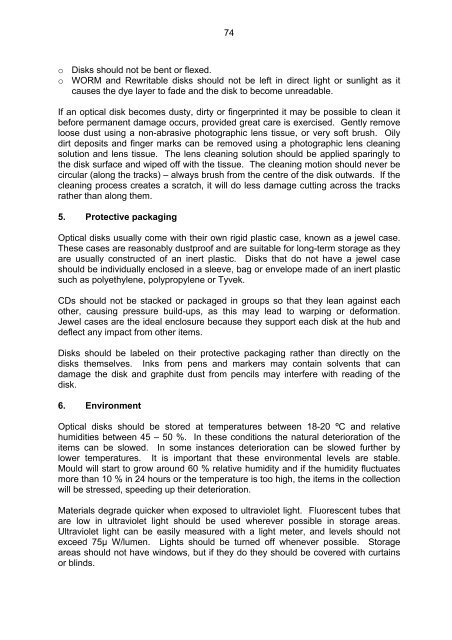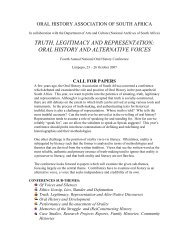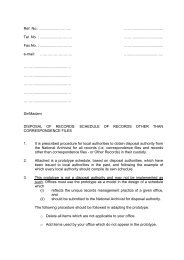managing electronic records in governmental bodies - National ...
managing electronic records in governmental bodies - National ...
managing electronic records in governmental bodies - National ...
Create successful ePaper yourself
Turn your PDF publications into a flip-book with our unique Google optimized e-Paper software.
74<br />
o Disks should not be bent or flexed.<br />
o WORM and Rewritable disks should not be left <strong>in</strong> direct light or sunlight as it<br />
causes the dye layer to fade and the disk to become unreadable.<br />
If an optical disk becomes dusty, dirty or f<strong>in</strong>gerpr<strong>in</strong>ted it may be possible to clean it<br />
before permanent damage occurs, provided great care is exercised. Gently remove<br />
loose dust us<strong>in</strong>g a non-abrasive photographic lens tissue, or very soft brush. Oily<br />
dirt deposits and f<strong>in</strong>ger marks can be removed us<strong>in</strong>g a photographic lens clean<strong>in</strong>g<br />
solution and lens tissue. The lens clean<strong>in</strong>g solution should be applied spar<strong>in</strong>gly to<br />
the disk surface and wiped off with the tissue. The clean<strong>in</strong>g motion should never be<br />
circular (along the tracks) – always brush from the centre of the disk outwards. If the<br />
clean<strong>in</strong>g process creates a scratch, it will do less damage cutt<strong>in</strong>g across the tracks<br />
rather than along them.<br />
5. Protective packag<strong>in</strong>g<br />
Optical disks usually come with their own rigid plastic case, known as a jewel case.<br />
These cases are reasonably dustproof and are suitable for long-term storage as they<br />
are usually constructed of an <strong>in</strong>ert plastic. Disks that do not have a jewel case<br />
should be <strong>in</strong>dividually enclosed <strong>in</strong> a sleeve, bag or envelope made of an <strong>in</strong>ert plastic<br />
such as polyethylene, polypropylene or Tyvek.<br />
CDs should not be stacked or packaged <strong>in</strong> groups so that they lean aga<strong>in</strong>st each<br />
other, caus<strong>in</strong>g pressure build-ups, as this may lead to warp<strong>in</strong>g or deformation.<br />
Jewel cases are the ideal enclosure because they support each disk at the hub and<br />
deflect any impact from other items.<br />
Disks should be labeled on their protective packag<strong>in</strong>g rather than directly on the<br />
disks themselves. Inks from pens and markers may conta<strong>in</strong> solvents that can<br />
damage the disk and graphite dust from pencils may <strong>in</strong>terfere with read<strong>in</strong>g of the<br />
disk.<br />
6. Environment<br />
Optical disks should be stored at temperatures between 18-20 ºC and relative<br />
humidities between 45 – 50 %. In these conditions the natural deterioration of the<br />
items can be slowed. In some <strong>in</strong>stances deterioration can be slowed further by<br />
lower temperatures. It is important that these environmental levels are stable.<br />
Mould will start to grow around 60 % relative humidity and if the humidity fluctuates<br />
more than 10 % <strong>in</strong> 24 hours or the temperature is too high, the items <strong>in</strong> the collection<br />
will be stressed, speed<strong>in</strong>g up their deterioration.<br />
Materials degrade quicker when exposed to ultraviolet light. Fluorescent tubes that<br />
are low <strong>in</strong> ultraviolet light should be used wherever possible <strong>in</strong> storage areas.<br />
Ultraviolet light can be easily measured with a light meter, and levels should not<br />
exceed 75µ W/lumen. Lights should be turned off whenever possible. Storage<br />
areas should not have w<strong>in</strong>dows, but if they do they should be covered with curta<strong>in</strong>s<br />
or bl<strong>in</strong>ds.
















